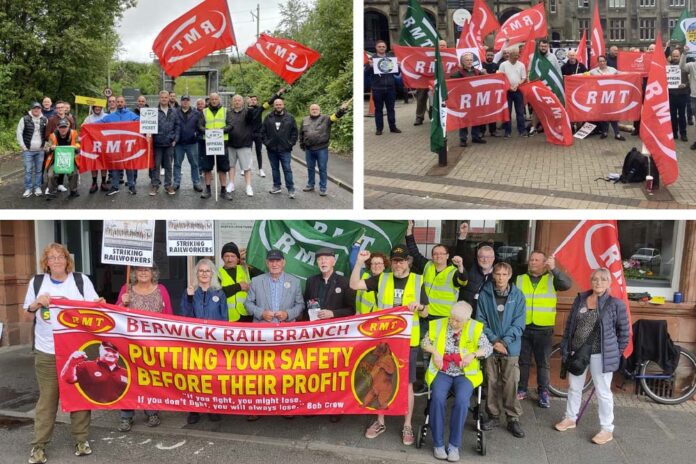Today, 40,000 staff and 10,000 London Underground union members are on strike.
Both are represented by RMT, which, in the case of national rail workers, has organised the industrial action over pay, job security and safety. The London Underground workers are striking over pensions and job losses.
On Newsnight last night, RMT general secretary Mick Lynch said that Network Rail handed statutory redundancy notices to the union after it briefly left talks to confirm that strikes would go ahead. You can see a letter from Network Rail to unions about possible redundancies in Nigel Wordsworth’s analysis, here.
Passengers listened to strike warnings
The industrial action has seen many rail operators today strip back services or cancel routes entirely.
One operator has said the public has listened to advice which has urged passengers to only get on trains when absolutely necessary. It said trains were carrying only a small number of people compared to usual services.
Meanwhile there was an uptick in traffic. Sky reports that Manchester saw a 2% bump, whilst in London — where the strikes were also on the London Underground — congestion rose by 13%.
You can see a breakdown of how services are affected by strikes here.
Stay the course
In cabinet, prime minister Boris Johnson said that the public need to “stay the course”. He added: “Because these reforms, these improvements in the way we run our railways, are in the interests of the travelling public, they will help to cut costs for fare payers up and down the country.
“But they’re also in the interests of the railways, of railway workers and their families, because otherwise if we don’t do this, these great, great companies, this great industry will face further financial pressure; it will go bust and the result will be they have to hike up the costs of tickets still further, so that people don’t use the railways at all or use them much less than they used to.”
Calls for government involvement
Earlier today, Scotland’s minister for transport, Jenny Gilruth, sent a letter to Grant Shapps. She said “Scotland looks set to be one of the worst affected parts of the GB Rail network from today – I am therefore seeking an urgent undertaking from you, to that end, that as UK Transport Secretary you will do all that you can to seek a resolution to this dispute, as quickly as possible, for the benefit of staff and passengers alike.”
She said she tried to schedule a meeting with rail minister Wendy Morton, set for later this week, but that it had been cancelled.
Her call echoes earlier a statement sent out by the Labour party earlier this week to the same effect.
On BBC morning news, in an interview with Shapps, it was highlighted that one contract between the Department of Transport and South Western says the operator’s handling of industrial action will always be subject to the secretary of state’s direction.
Shapps said he was “extremely involved” in working with unions on a modernised railway and compared the clause to one saying it was ultimately in charge of the NHS or postal workers.
He suggested it would mean ministers would undermine and disrupt the process if government intervened.
Exceeded expectations
At the end of the working day, RMT general secretary Mick Lynch considered the strike a success. He said: “Today’s turnout at picket lines has been fantastic and exceeded expectations in our struggle for job security, defending conditions and a decent pay rise.
“Our members will continue the campaign and have shown outstanding unity in pursuit of a settlement to this dispute.
“RMT members are leading the way for all workers in this country who are sick and tired of having their pay and conditions slashed by a mixture of big business profits and government policy.
“Now is the time to stand up and fight for every single railway worker in this dispute that we will win.”
However, it is fair to say that, according to the Rail Delivery Group, it has not been as well received. The group, which comprises train operators, HS2 and Network Rail said a YouGov poll they commissioned found that of 1,678 adults only about 25% supported the strike. However, YouGov also reported on a self-commissioned poll that says, although it broadly agrees most people oppose the strike, the number is different — on that sample, support was at 38% whilst opposition was at 45%.
Meanwhile, a Savanta ComRes poll said that 58% of 2,336 respondents believed the rail strikes were justified.
YouGov also found 60% of people opposed getting rid of manned ticked offices at stations.







































 0113 2082620
0113 2082620 info@railbusinessdaily.com
info@railbusinessdaily.com 15 Mariner Court, Wakefield WF4 3FL
15 Mariner Court, Wakefield WF4 3FL

